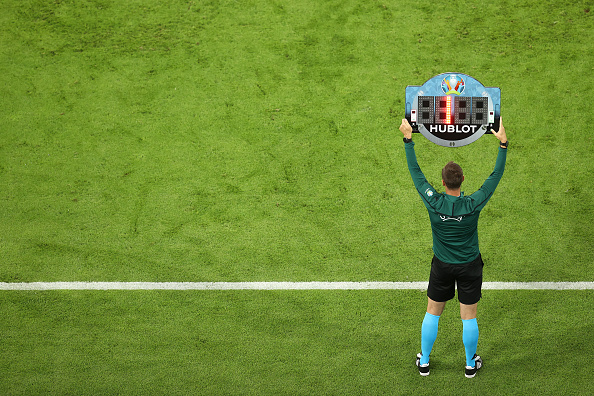A stop-clock and 60-minute football matches? Why IFAB’s solution for time-wasting, borrowed from US sports, would be a waste of time

Football lawmakers IFAB’s idea of tackling time-wasting with a stop-clock and 60-minute matches is misguided, writes Frank Dalleres.
The headline news from this week’s meeting of football’s lawmakers was their decision to not to go ahead with a trial of temporary concussion substitutes.
But also on the agenda at the annual business meeting of the International Football Association Board (IFAB) was another hot topic: how to reduce time-wasting.
The amount of time that the ball spent in play in Premier League matches last season fell to an average of 55 minutes and seven seconds – its lowest level for 11 years.
And that figure fell further with each division of the English professional game, with games in the fourth tier averaging just 49 minutes and 45 seconds.
“We believe that is not really acceptable that if we say that a game of football is a game of 90 minutes, but in reality, only 46, 47 or 48 minutes are played,” Gianni Infantino, president of football’s world governing body, said last year.
One solution trialled at the Qatar 2022 World Cup was a far stricter application of stoppage time, with England’s group stage win over Iran featuring a total of 27 minutes added on.
In an update following its meeting at Wembley Stadium yesterday, IFAB said the approach taken at the World Cup had been “received positively”.
But another idea that has gained some high-profile support is to reduce matches to 60 minutes but use a stop-clock like those in American football and basketball.
Former Premier League referee Mark Clattenburg is among those in favour of the stop-clock, saying: “It works in basketball and it could work in football, too.”
Fifa referees’ chief Pierluigi Collina, meanwhile, compared it to the outlawing of goalkeepers picking up backpasses, which was implemented to speed up play in 1992.
“The initial reaction is ‘football will never be the same again’. Today, however, it is obvious that it is much more fun. So we are doing some thinking,” Collina said.
But football should think very carefully about whether it really wants to follow the blueprint laid out by US sports.
The NFL has a 60-minute clock which is paused every time play stops. Games usually last between three and four hours, almost twice as long as football matches.
The closing stages of NFL games can feel like interminable hokey-cokeys in which the ball goes in and out of play every few seconds.
Why wouldn’t football matches go the same way, with teams engineering breaks to halt their opponents’ momentum or take on coaching instructions, if a stop-clock was introduced?
Broadcasters might like the chance to fill these endless stoppages with advertisements, as in US sports, but this could be a disaster from an entertainment perspective, which was one of the reasons for trying it in the first place.
Far from eradicating time-wasting, it could make the problem much bigger.
IFAB has already tied itself in knots over the video assistant referee and the application of the offside law. Should it really be thinking of tinkering with timings too?
Players’ union Fifpro declared itself “greatly disappointed” with IFAB this week over its stance on concussion subs.
Football’s lawmakers can expect an even bigger backlash if they turn the game into a gridiron-style festival of interruptions.
